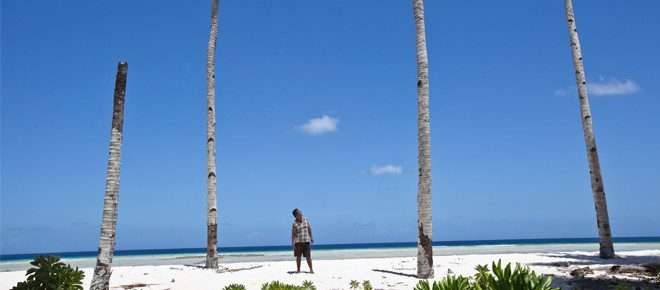New Zealand and Australia must face up to the reality that climate change threatens the survival of some of their closest neighbours

New Zealand and Australia must face up to the reality that climate change threatens the survival of some of their closest neighbours, and join them in the strongest possible call to action at this week’s Pacific Islands Forum in Port Moresby.
Climate change is high on the agenda at the Pacific Islands Forum which kicks off today, September 7 – 11. The forum comes just ahead of the six-month anniversary of Cyclone Pam (13 September), one of the strongest cyclones ever recorded in the Pacific, which brought devastation to Vanuatu.
Oxfam’s report out today, A Question of Survival, outlines how Pacific communities are calling on New Zealand and Australia to join Pacific Island leaders in an unequivocal statement and commitment setting out the minimum requirements for a new international climate agreement that would ensure the survival of all Pacific Island Forum members.
A ‘wake up call’
Oxfam New Zealand’s Chief Executive, Rachael Le Mesurier, said the threat to the region could not be overstated.
“The devastation from Cyclone Pam in Vanuatu and severe flooding in the low-lying nations of Tuvalu, Kiribati and the Marshall Islands this year should have been a wake-up call for New Zealand and Australia as real examples of the dangers and hardship facing the Pacific,” Le Mesurier said.
“However, the two ‘big brothers’ of the Pacific have largely ignored their neighbours’ calls for stronger emissions reduction targets and greater support to meet the challenges of climate change.”
Already too late?
Pacific Island nations have been highly critical of New Zealand and Australia’s emission reduction targets and backward steps on climate change, and have voiced fears that for some Pacific Island communities it is already too late.
Both countries will be under pressure to up their game at the Pacific Islands Forum Leaders Meeting – the most important annual political meeting for the region – ahead of the UN Paris climate conference at the end of the year.
All Pacific Island countries and territories have pushed for a goal to limit the global average temperature rise to 1.5C, based on clear evidence that the current goal of 2C will push many beyond their ability to adapt. They also have been united in calls for developed countries to fulfill their commitments to help poorer countries tackle climate change, and make provisions to address permanent losses in cases where it is impossible to adapt, such as lost land and livelihoods.
“New Zealand and Australia must substantially increase their current emissions reduction targets. But they also need to provide clarity on how they will meet their international climate finance commitments, and help ensure vulnerable communities in the Pacific can access the support they need,” she said.
Le Mesurier said the initial contribution from the Australian Government towards the new global climate agreement, to be finalised in Paris, fell far short of a fair contribution towards keeping the global temperature rise below 2C, let alone the 1.5C limit for which Pacific Island leaders were rightly advocating.
“The question remains whether New Zealand will do the right thing by the Pacific and ensure the Leaders Meeting sends the strongest possible signal ahead of Paris, or whether, together with Australia, it will use its influence in the Forum to weaken any outcomes,” Le Mesurier said.





